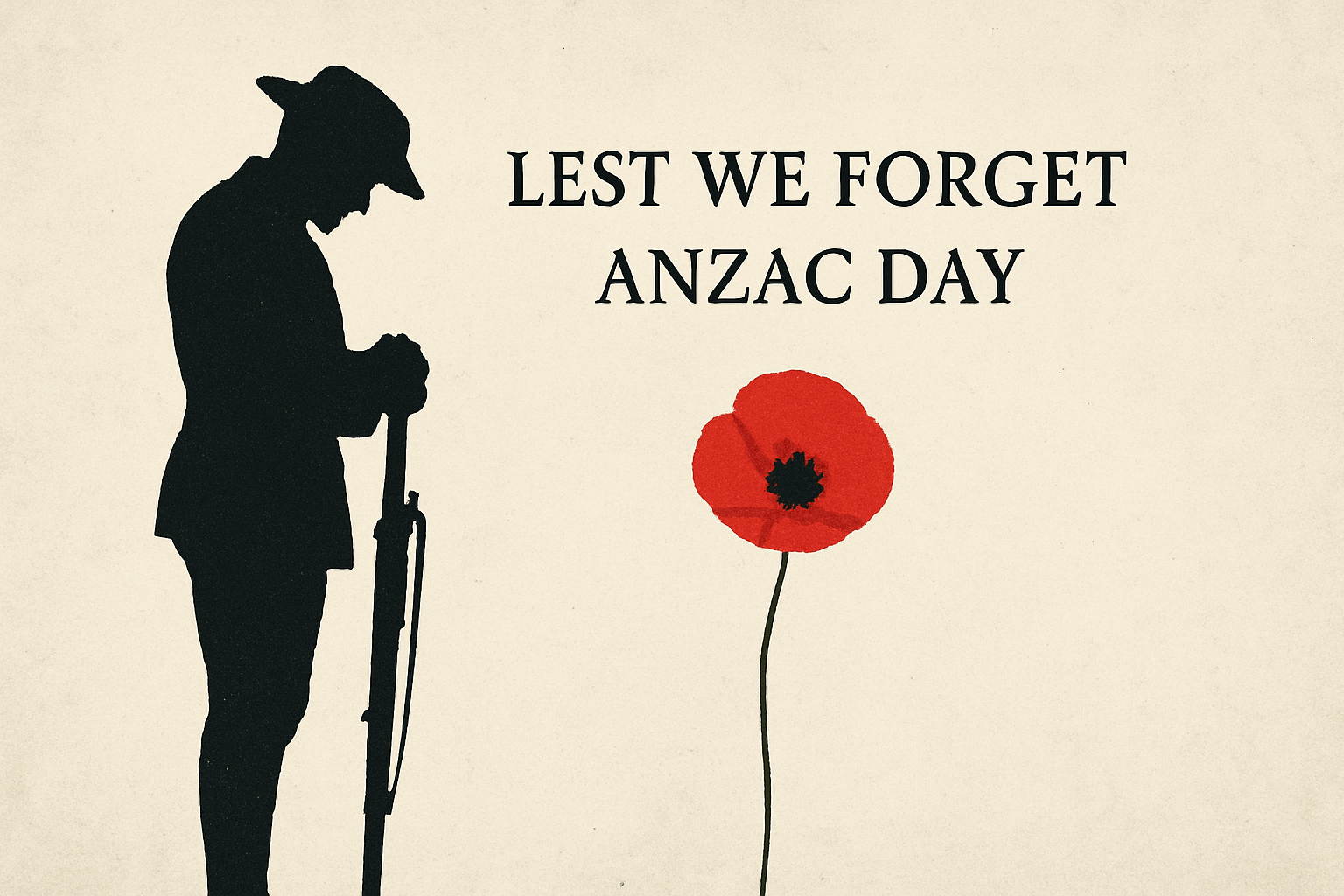This year, the rain forced our local Anzac Day service indoors, but it didn’t diminish its significance. It never really does.
Why Anzac Day is important to me
Military service is stitched into the seams of my family. My dad and sister have both served during modern peacetime. I grew up as an Air Force Cadet, polishing boots and learning how to iron a uniform within an inch of its life. But then there are the deeper roots with countless relatives serving in active conflicts, including my great-great-uncle Trooper John James Sainsbury of the 12th Light Horse Regiment, killed in action in Palestine in 1917. These stories aren’t distant history: they’re bloodline.
So when I say Anzac Day matters, I mean it. I feel it.
This Anzac Day is particularly significant
This year marks a series of solemn milestones:
- 110 years since the Gallipoli landing.
- 80 years since the end of the Second World War.
- 50 years since the end of the war in Vietnam.
My family’s history, like the broader history of this country, is interwoven with military service, and each of these anniversaries speaks to the enduring relevance of those sacrifices. Gallipoli shaped our national identity, WWII tested the world’s resilience and Vietnam challenged our politics and our conscience. Marking these moments is not just about looking back but about carrying forward the lessons, the losses and the legacy.
Knowledge of war must not be lost
Every year the services get a little quieter, not in attendance but in the number of veterans. That baton of memory? It’s in our hands now. It’s our job to hold the knowledge not just recite it.
And by knowledge I don’t mean trivia or timelines but rather the human experience: the why and the what-the-hell-for and the never-again. The sense of sacrifice, of community and of the catastrophic cost of forgetting.
You don’t have to be a war historian to hold knowledge, you merely have to care enough to listen to the stories, to the silences, to the weight that lingers in a returned serviceman’s sigh.
As part of this knowledge, it’s vital we remember the stories of Aboriginal and Torres Strait Islander diggers whose stories have too often been left out of the national narrative. Despite being denied basic rights at home, thousands enlisted to serve a country that didn’t serve them equally. They fought alongside their peers with courage and skill, yet returned to a society that largely ignored their sacrifice. Honouring Anzac Day means lifting these stories too, not as footnotes, but as fundamental parts of our shared history.
Anzac Day as ritual
There’s something deeply spiritual about Anzac Day, though we don’t often say it like that. It’s ritual, it’s communion. It’s standing shoulder to shoulder in the cold of morning, watching the sun rise on memory. A kind of modern liturgy, where the congregation is half in uniform and the hymns are the clinking of medals and the soft shuffle of quiet feet.
And if you didn’t make it to a service this year, that’s alright. There’s always next time. But don’t let it just be a day off or a reason to hit the pub early. (Though sure, do the pub thing: diggers loved a beer but know why you’re there.)
- Start a conversation.
- Ask your parents about the deployments of family.
- Visit a war memorial.
- Visit a place where history was made: whether it’s Anzac Cove, a local memorial or a site of personal family significance
- Read the service record of someone you’re related to.
Be a witness
While I’ve not yet made it to Anzac Cove, I’ve been to a number of other sites of historical relevance to both Australia and our allies. Let me tell you, those places don’t just inform you, they transform you. They press something into your chest that stays there long after you leave: the horror of what humanity is capable of and why peace is so important.
You learn very quickly that history, when experienced up close, doesn’t just whisper. It shouts. These are the types of experiences that ensure the memory isn’t lost with the passing of those who lived it. They sit with you as a discomfort, a reverence, a warning.
In the end, holding these memories isn’t to glorify war but rather the opposite: it’s to understand it, to bear witness to it and to make sure we’re never so cavalier that we let the next generation learn the same brutal lessons all over again.
Lest we forget.

Leave a Reply